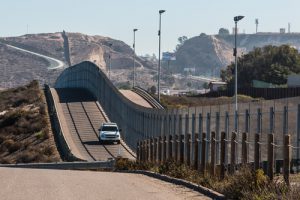
U.S. Rep. Kevin Yoder (R-KS), chairman of the U.S. House Appropriations Subcommittee on Homeland Security, said the challenging landscape and scant federal investment in border security has allowed the proliferation of illegal activities along the United States-Mexico border.
“My biggest takeaway from the last 48 hours is the Rio Grande Valley region is being heavily targeted by Mexican cartels for human and drug trafficking in between ports of entry” due to those factors, Rep. Yoder said on June 6 after concluding a two-day fact-finding mission to the area.
The congressman said the United States “must invest in personnel, technology and a physical barrier as well as close loopholes to fix our vulnerabilities in the Rio Grande Valley.”
In his new role as chairman of the House Appropriations Subcommittee on Homeland Security, recently announced on May 16, Rep. Yoder oversees the subcommittee having jurisdiction over the U.S. Department of Homeland Security (DHS) and its related agencies, which include Customs and Border Protection (CBP), Immigration and Customs Enforcement (ICE), the Transportation Security Administration, and the Federal Emergency Management Agency, among others.
The full U.S. House Appropriations Committee, which is chaired by U.S. Rep. Rodney Frelinghuysen (R-NJ), is in the midst of the fiscal year 2019 funding season. Forthcoming legislation to fund homeland security measures will set the priorities of the United States government with regard to border security, immigration enforcement, counterterrorism, drug and human trafficking, cyberterrorism, natural disaster response, aviation security, and customs activities, according to information from Rep. Yoder’s office.
“I stand ready to tackle these issues as we take up the Homeland Security appropriations bill in the coming weeks,” he said.
In detailing his recent trip to the Rio Grande Valley region, Rep. Yoder said, “Tens of thousands of pounds of cocaine, heroin and other drugs and more than 100,000 humans are being smuggled across just this one 300-mile stretch of the border.”
Criminals in Mexico, he said, are reaping hundreds of millions in revenue as cartels send an estimated $64 billion a year in drugs to America across the border.
“This dangerous situation has created an influx of crime and violence on both sides of the border, which poses a significant safety risk to the American people in places like Kansas and all across America,” said Rep. Yoder.
During his trip, the congressman also visited the CBP and learned about the challenges faced by border patrol agents, who Yoder said “are apprehending thousands of illegal crossings each week in a sophisticated effort to use cameras and other technological means to bust human and drug traffickers.”
“For the CBP to more effectively reduce human and drug smuggling, they will need more border patrol agents, as well as additional investments in technology and barriers,” said Rep. Yoder, who suggested adding approximately 100 miles or more of a border wall, which he said “would dramatically reduce the amount of illegal border crossings.”
Currently, according to Yoder’s staff, 654 miles of barriers already exist along the Southwest border. However, only 354 miles of the existing barriers are capable of stopping pedestrian entry, while 300 miles of barriers can stop vehicle entry.
At the same time, Rep. Yoder said, the nation also must fix its broken immigration laws.
“More than a dozen loopholes allow apprehended illegal immigrants to claim amnesty or a host of other protections exploiting a five-year backlog in our court system,” said the congressman. “These loopholes have caused significant morale problems with border patrol agents who risk their lives to apprehend illegal immigrants crossing the border to only see those taken into custody released into the United States with a promise to attend a court hearing five years later.”



